外研版2019-2020学年八年级英语上册Module 6 Animals in danger模块测试题及答案
外研版英语八年级上册Module6《Animalsindanger》(Unit1)说课稿

外研版英语八年级上册Module 6《Animals in danger》(Unit 1)说课稿一. 教材分析《Animals in danger》是人教版英语八年级上册Module 6的一课,主要内容是讨论动物濒危的问题。
本课通过介绍一些濒危动物,让学生了解动物濒危的原因以及我们应该如何保护它们。
教材内容丰富,插图生动,激发了学生学习兴趣。
同时,本课还要求学生能够运用所学知识进行讨论和表达,提高他们的语言运用能力。
二. 学情分析八年级的学生已经掌握了基本的英语语法和词汇,具备一定的听说读写能力。
他们对于动物保护这一话题感兴趣,且有一定的社会责任感和保护意识。
但部分学生可能在表达自己的观点时存在困难,因此需要教师在教学过程中给予适当的引导和帮助。
三. 说教学目标1.知识目标:学生能够掌握濒危动物的相关词汇和表达方式,理解课文内容,了解动物濒危的原因和保护方法。
2.能力目标:学生能够运用所学知识进行讨论和表达,提高他们的语言运用能力。
3.情感目标:学生能够增强保护动物的意识,提高他们的社会责任感和关爱他人的情感。
四. 说教学重难点1.重点:学生能够掌握濒危动物的相关词汇和表达方式,理解课文内容。
2.难点:学生能够运用所学知识进行讨论和表达,特别是如何正确表达自己的观点。
五. 说教学方法与手段1.交际式教学法:通过小组讨论、pr work等形式,激发学生的学习兴趣,提高他们的语言运用能力。
2.任务型教学法:通过完成保护动物的计划任务,培养学生的团队合作意识和解决问题的能力。
3.多媒体教学手段:利用多媒体课件和视频,生动形象地展示濒危动物,增强学生的学习兴趣。
六. 说教学过程1.导入:教师通过提问方式引导学生谈论他们喜欢的动物,引出本课主题。
2.呈现:教师通过展示濒危动物的图片和视频,呈现本课的主要内容。
3.讲解:教师讲解课文内容,帮助学生理解动物濒危的原因和保护方法。
4.实践:学生进行小组讨论,讨论如何保护动物,并完成保护动物的计划任务。
最新外研版八年级上册英语Module 6 基础词汇及句型总结

Module 6Animals in danger第一关单词分类记*描述动物及生活的有关词汇1. snake n. 蛇2. neck n. 颈; 脖子3. thin adj. 薄的; 细长的4. interested adj. 关心的; 感兴趣的5. danger n. 危险; 危害6. grow v. (grew)(逐渐)变得; 生长7. enough a dj. 足够的; 充分的8. wild adj. 野生的n. 野生环境9. peace n. 和平; 太平10. situation n. 形势; 情况11. produce v. 生育; 繁殖12. nature n. 大自然; 自然界13. feed v. (fed) 喂养; 饲养14. symbol n. 象征; 标志*描述行为动作的有关词汇15. protect v. 保护; 保卫16. allow v. 允许; 准许17. raise v. 筹集(钱款); 抚养; 养育18. research n. 研究; 探讨19. set v. 设置; 设定20. develop v. 研制; 制定*描述人或事物名称的有关词汇21. baby n. 婴儿; 婴孩22. scientist n. 科学家23. government n. 政府*表示方向的词汇24. southwest n. 西南adj. 西南的; 朝西南的第二关短语快速记1. in danger处于危险中2. at last 终于, 最后3. think of 想到, 想出4. take away 夺去, 拿走5. in peace 和平地; 平静地6. look after 照顾, 照管7. in order to 为了8. set up 开办; 设立; 创办; 建立9. nature park 自然公园第三关句式秒杀记1. But I am more interested to see the pandas in the Wolong Panda Reserve, because it allows people to get closer to them.但我对看卧龙熊猫保护区里的熊猫更感兴趣, 因为它允许人们离它们更近。
外研版八年级英语上册Module 6 Animals in danger Unit 2 The WWF is working hard to save them all
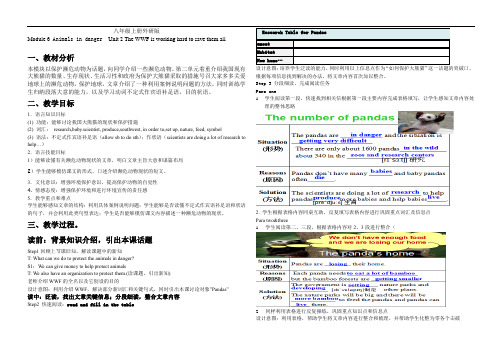
本模块以保护濒危动物为话题,向同学介绍一些濒危动物。
第二单元着重介绍我国现有大熊猫的数量、生存现状、生活习性和政府为保护大熊猫采取的措施号召大家多多关爱地球上的濒危动物,保护地球。
文章介绍了一种利用案例说明问题的方法,同时训练学生归纳段落大意的能力,以及学习动词不定式作宾语补足语,目的状语。
二、教学目标1.语言知识目标(1) 功能:能够讨论我国大熊猫的现状和保护措施(2)词汇: research,baby.scientist, produce,southwest, in order to,set up, nature, feed, symbol (3) 语法:不定式作宾语补足语(allow sb to do sth );作状语(scientists are doing a lot of research to help…)2.语言技能目标1)能够读懂有关濒危动物现状的文章,明白文章主旨大意和谋篇布局 2)学生能够模仿课文的形式,口述介绍濒危动物现状的短文。
3.文化意识:增强环境保护意识,提高保护动物的自觉性 4. 情感态度:增强保护环境和进行环境宣传的责任感 5.教学重点和难点学生能够感知文章的结构:利用具体案例说明问题;学生能够是否读懂不定式作宾语补足语和状语的句子,并会利用此类句型表达;学生是否能够模仿课文内容描述一种濒危动物的现状。
三、教学过程。
读前:背景知识介绍,引出本课话题Step1回顾上节课旧知,解读课题中的新知T: What can we do to protect the animals in danger? S1:We can give money to help protect animalsT: We also have an organization to protect them.(读课题,引出新知) 老师介绍WWF 的全名以及它创设的目的设计意图:利用介绍WWF ,解决部分新词汇和关键句式,同时引出本课讨论对象”Pandas”读中:泛读,找出文章关键信息;分段细读,整合文章内容Step2 快速阅读:read and fill in the table设计意图:培养学生泛读的能力,同时利用以上信息点作为“如何保护大熊猫”这一话题的突破口,根据每项信息找到解决的办法,将文章内容首次加以整合。
外研版八年级英语上册《Module6AnimalsindangerUnit2》说课稿1

外研版八年级英语上册《Module 6 Animals in danger Unit 2》说课稿1一. 教材分析《Module 6 Animals in danger Unit 2》是人教版八年级英语上册的一篇课文,本节课的话题是关于动物保护。
本节课的主要内容是让学生们通过阅读和听力练习,了解一些濒临灭绝的动物以及它们所面临的问题。
同时,本节课还要求学生们能够运用所学的知识,就动物保护问题进行讨论和交流。
二. 学情分析根据我对学生的了解,他们已经具备了一定的英语基础知识,能够进行简单的阅读和听力理解。
但是,他们的英语口语表达能力还有待提高,同时对于一些动物的名称和特点可能不是很熟悉。
因此,在教学过程中,我需要帮助学生们克服这些困难,提高他们的阅读和听力理解能力,同时也要提高他们的口语表达能力。
三. 说教学目标1.知识目标:让学生们掌握本节课的生词和短语,能够正确地朗读和拼写。
让学生们能够理解课文内容,掌握课文的结构和主旨。
2.能力目标:通过阅读和听力练习,提高学生们的故事梗概提炼能力;通过小组讨论,提高学生们的口语表达能力;通过课后作业,提高学生们运用所学知识进行写作的能力。
3.情感目标:让学生们认识到保护动物的重要性,增强他们的环保意识。
四. 说教学重难点1.教学重点:让学生们掌握课文中的生词和短语,能够正确地朗读和拼写;让学生们理解课文内容,掌握课文的结构和主旨。
2.教学难点:让学生们能够运用所学知识,就动物保护问题进行讨论和交流;让学生们能够正确地使用一般现在时进行叙述。
五. 说教学方法与手段在本节课的教学过程中,我将采用任务型教学法和交际法进行教学。
通过设计各种任务,让学生们在完成任务的过程中,自然地学习和使用英语。
同时,我还会运用多媒体教学手段,如课件、视频等,来帮助学生们更好地理解和掌握课文内容。
六. 说教学过程1.导入:通过展示一些濒临灭绝的动物的图片,引起学生们的兴趣,导入新课。
2019-2020年外研版英语八年级上Module 6 Animals in danger.Uni
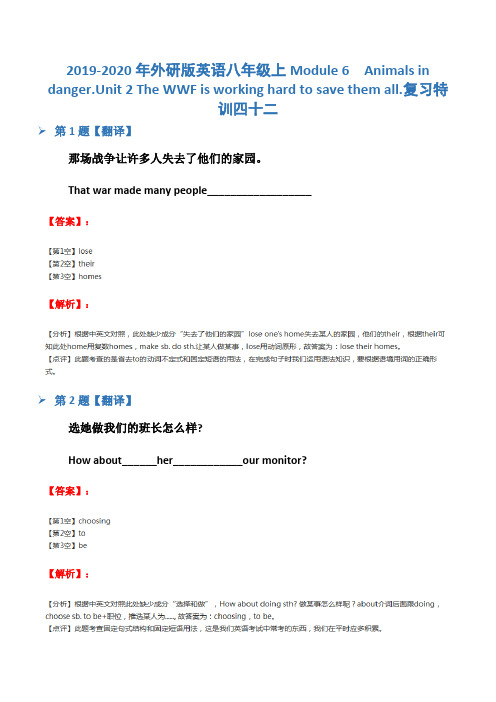
2019-2020年外研版英语八年级上Module 6 Animals in danger.Unit 2 The WWF is working hard to save them all.复习特训四十二➢第1题【翻译】那场战争让许多人失去了他们的家园。
That war made many people__________________【答案】:【解析】:➢第2题【翻译】选她做我们的班长怎么样?How about______her____________our monitor?【答案】:【解析】:➢第3题【翻译】你能帮我照顾我的狗吗?Can you help me____________my dog?【答案】:【解析】:➢第4题【翻译】没有什么可担心的。
There"s nothing to__________________.【答案】:【解析】:➢第5题【翻译】每天老虎需要吃大量的肉。
The tiger needs to eat__________________meat every day.【答案】:【解析】:➢第6题【选词填空(词汇运用)】Jack is a worker and he______in the factory.One of the largest______in China is in Wolong, Sichuan.Three years ago, Mr Smith______this primary school.Ben is looking forward to______his home town to see his grandma.______make it safe, please close the door when leaving the room.【答案】:【解析】:➢第7题【选词填空(词汇运用)】Tom usually buys sausages to______his dog.Yunnan and Sichuan are in the______of China.Don"t worry. Mr Wang will help us in all kinds of______ .They did lots of______about India to know about this country.The two______were born at the same time.【答案】:【解析】:➢第8题【单词拼写(词汇运用)】With the help of the______(政府), great changes took place in my home town. 【答案】:【解析】:➢第9题【单词拼写(词汇运用)】______(科学家) are trying to make perfect robots.【答案】:【解析】:➢第10题【单词拼写(词汇运用)】Both the Great Wall and pandas are______(象征) of China.【答案】:【解析】:➢第11题【单词拼写(词汇运用)】Lisa and her brother are______(制定) plans for the coming year. 【答案】:【解析】:。
外研社八年级英语上册Module6知识点

Module 6 Animals in danger一、重点词组1、at last 最后;终于2、in peace 平安地;和平;3、in danger 在危险中,有…的危险4、look after 照顾,照看(某人或某物);5、find out 找出,查出;查明,发现;6、in order to 为了…7、set up 建立;准备;二、重点句型1、But I am more interested to see the pandas in the Wolong Panda Reserve.be interested to do sth. 对做……感兴趣be interested in sth. 对……感兴趣2、…because it allows people to get closer to them.allow sb. to d o sth. 允许某人去做某事3、It’s sad to think of pandas and other animals in danger.think of 想到,想出,认为,考虑in danger 处于险境,处于危险之中4、… have a safe place to live 表示“有安全的居住地”。
to live放在名词place的后面做定语。
5、Each pandas needs to eat a lot of bamboo every day.every 和each:●every “每”“各”,指三者或三者以上的整体,含有全体之意。
●each “每一”“每个”,指两个或两个以上的每一个,着重于个别,如团体中一个的人或物。
6、In order to protect pandas in the wild, the government is setting up nature parks …set up 创建,创办in order (not) to do sth. 为了(不)做……三、重点语法点动词不定式1、不定式的形式动词不定式的基本形式是“to+动词原形”,其否定形式为not + (to)+ 动词原形。
新外研版八年级上册module6Animals_in_danger知识点及练习题
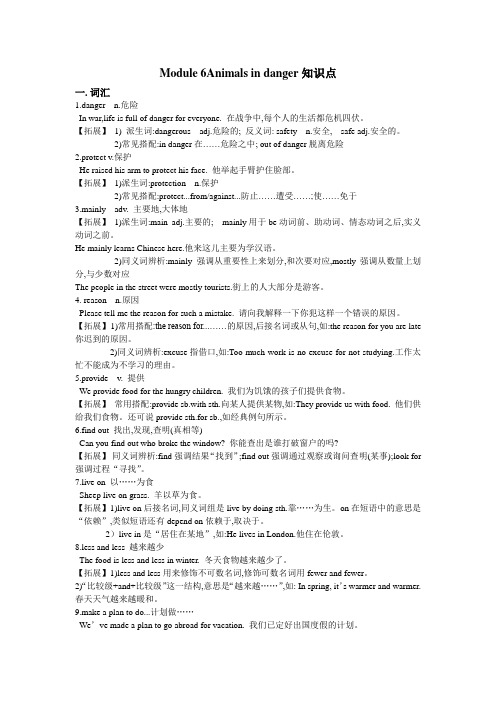
Module 6Animals in danger知识点一.词汇1.danger n.危险In war,life is full of danger for everyone. 在战争中,每个人的生活都危机四伏。
【拓展】1) 派生词:dangerous adj.危险的; 反义词: safety n.安全, safe adj.安全的。
2)常见搭配:in danger在……危险之中; out of danger脱离危险2.protect v.保护He raised his arm to protect his face. 他举起手臂护住脸部。
【拓展】1)派生词:protection n.保护2)常见搭配:protect...from/against...防止……遭受……;使……免于3.mainly adv. 主要地,大体地【拓展】1)派生词:main adj.主要的; mainly用于be动词前、助动词、情态动词之后,实义动词之前。
He mainly learns Chinese here.他来这儿主要为学汉语。
2)同义词辨析:mainly 强调从重要性上来划分,和次要对应,mostly强调从数量上划分,与少数对应The people in the street were mostly tourists.街上的人大部分是游客。
4. reason n.原因Please tell me the reason for such a mistake. 请向我解释一下你犯这样一个错误的原因。
【拓展】1)常用搭配:the reason for...……的原因,后接名词或从句,如:the reason for you are late 你迟到的原因。
2)同义词辨析:excuse指借口,如:Too much work is no excuse for not studying.工作太忙不能成为不学习的理由。
5.provide v. 提供We provide food for the hungry children. 我们为饥饿的孩子们提供食物。
外研版八年级英语上Module 6讲义(含导入及详细知识点)
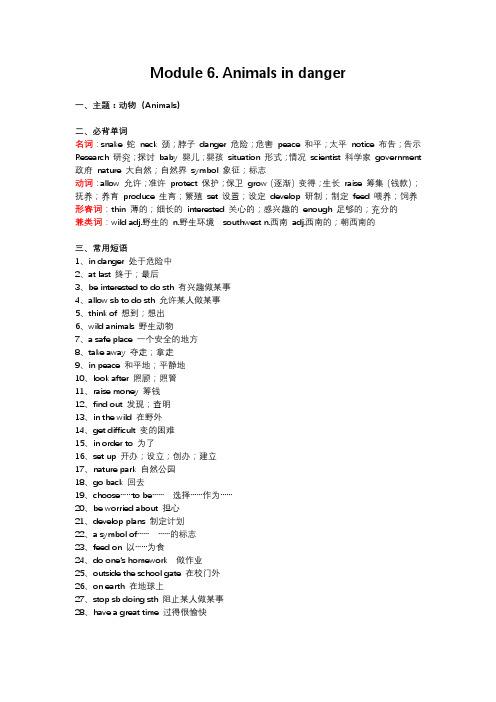
Module 6. Animals in danger一、主题:动物(Animals)二、必背单词名词:snake 蛇neck 颈;脖子danger 危险;危害peace 和平;太平notice 布告;告示Research 研究;探讨baby 婴儿;婴孩situation 形式;情况scientist 科学家government 政府nature 大自然;自然界symbol 象征;标志动词:allow 允许;准许protect 保护;保卫grow(逐渐)变得;生长raise 筹集(钱款);抚养;养育produce 生育;繁殖set 设置;设定develop 研制;制定feed 喂养;饲养形容词:thin 薄的;细长的interested 关心的;感兴趣的enough 足够的;充分的兼类词:wild adj.野生的n.野生环境southwest n.西南adj.西南的;朝西南的三、常用短语1、in danger 处于危险中2、at last 终于;最后3、be interested to do sth 有兴趣做某事4、allow sb to do sth 允许某人做某事5、think of 想到;想出6、wild animals 野生动物7、a safe place 一个安全的地方8、take away 夺走;拿走9、in peace 和平地;平静地10、look after 照顾;照管11、raise money 筹钱12、find out 发现;查明13、in the wild 在野外14、get difficult 变的困难15、in order to 为了16、set up 开办;设立;创办;建立17、nature park 自然公园18、go back 回去19、choose……to be…… 选择……作为……20、be worried about 担心21、develop plans 制定计划22、a symbol of…… ……的标志23、feed on 以……为食24、do one‘s homework 做作业25、outside the school gate 在校门外26、on earth 在地球上27、stop sb doing sth 阻止某人做某事28、have a great time 过得很愉快四、重点句型1、动词不定式作宾语补足语的句型:……because it allows people to get closer to them.2、动词不定式作目的状语的句型:That means we can give money to help protect the animals.3、in order to 引导目的状语:In order to protect pandas in the wild, the government is setting up nature parks and developing other plans.五、模块语法1、动词不定式作宾语补足语(It allows people to get closer to them.)2、动词不定式作目的状语(Le t’s find out what else we can do to save as many animals as possible.)Module 6.Animals in danger 详细笔记1、in danger 表示“处于危险中”反义词:out of danger “脱离危险”Eg.Her life could be in danger, but the doctor said that she would be out of danger soon.她的生命可能有危险,但医生说她很快就会脱离危险。
外研版-英语-八上-外研八上Module6Animalsindanger知识讲解及练习

外研版-英语-八上-外研八上Module6Animalsindanger知识讲解及练习Module 6 Animals in danger词汇精讲1. interesting&interested这两个词都是形容词。
interesting表示某物本身有趣,强调主动,在句子中可以作定语、表语,多用来修饰物。
interested着重于被动意义,其主语一般是人。
常做表语,后接介词in,一起构成be interested in…结构,意为“对……感兴趣”。
例如:I am very interested in the interesting story.我对这个有趣的故事很感兴趣。
【拓展】英语中,带-ing的形容词,用来形容事物,指某事物的性质、特征,意为“令人……的”“让人……的”,常用事物作主语或作定语修饰物。
而带-ed的是用来形容人的,意为“感到……的”“使人……的”,其主语是人,类似的词有:exciting 令人兴奋的boring 令人厌烦的moving 令人感动的excited (人)感到兴奋的bored(人)感到厌烦的moved(人)感动的tiring 令人厌倦的surprising令人惊讶的tired(人)感到疲倦/累/厌烦的surprised(人)感到惊讶的2. grow(1)grow 作行为动词时,可以意为“种,种植”,是及物动词,后面可以直接跟宾语。
也可以意为“生长,成长”,是不及物动词,常与up构成短语,意为“长大”。
例如:My father grows vegetables by himself every year. (及物动词)我父亲每年自己种蔬菜。
The olive grows in Italy. (不及物动词)橄榄生长于意大利。
What are you going to do when you grow up? (和up连用)你长大后打算干什么?(2)grow 作连系动词,意为“逐渐变得”,后接形容词作表语。
外研版八年级英语上册 Module 6 Animals in danger 单元测试卷(有答案)
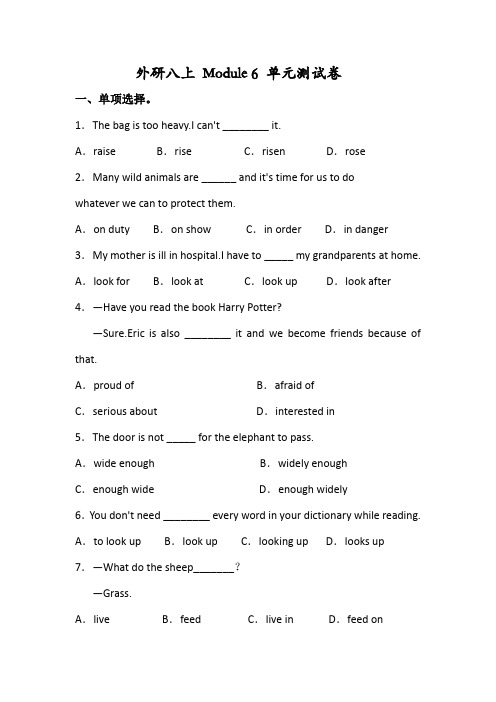
外研八上Module 6 单元测试卷一、单项选择。
1.The bag is too heavy.I can't ________ it.A.raise B.rise C.risen D.rose2.Many wild animals are ______ and it's time for us to dowhatever we can to protect them.A.on duty B.on show C.in order D.in danger 3.My mother is ill in hospital.I have to _____ my grandparents at home. A.look for B.look at C.look up D.look after 4.—Have you read the book Harry Potter?—Sure.Eric is also ________ it and we become friends because of that.A.proud of B.afraid ofC.serious about D.interested in5.The door is not _____ for the elephant to pass.A.wide enough B.widely enoughC.enough wide D.enough widely6.You don't need ________ every word in your dictionary while reading. A.to look up B.look up C.looking up D.looks up 7.—What do the sheep_______?—Grass.A.live B.feed C.live in D.feed on8.—Can I join your club, Dad?—You can when you ________ a bit older.A.get B.will get C.go D.will go 9.How kind you are! You always do what you can ______ others. A.help B.helping C.helps D.to help 10.Mickey Mouse is one of the most famous ________ in American ________.A.symbol;culture B.symbols;cultures C.symbols;culture 11. My parents didn't allow me _____ to the party.A.go B.to go C.goes D.went12.His mother wants him ________ at home today.A.stays B.stayed C.to stay D.staying13.They need to raise school things in order to ________ the children in the mountains.A.helps B.helping C.help D.helpful14.Mike went to the library ________ some books yesterday. A.borrow B.to borrow C.borrows D.borrowed 15.We should thank the man. He always does what he can ________ us. A.helps B.to help C.help D.helping二、从下面方框里选择合适的词,并用其正确形式填空。
外研版八年级上册英语Moudl6语法及写作

考点 2 作主语。动词不定式作主语时,句子的谓语 动词常用单数,其位置有以下两种:
考向一 把不定式置于句首 eg:To get there by bike will take us half an hour. 骑自行车到那儿将花费我们半个小时。 To save money now is impossible. 现在不可能存钱。
语法讲堂
动词不定式(二)
动词不定式除了能作宾语,还可作宾语补足语、主语、 表语、定语、状语等。 考点 1 作宾语补足语。
考向一 动词+宾语+不定式 加宾语后再加不定式的动词: ask,choose,expect,hate,help,like, love,invite,prefer,want,wish...
the party.
A.go
B.to go
C.goes
D.went
【点拨】此题用识记法解答。allow sb.to do sth.意为“允 许某人做某事”。
7.(模拟·凌海)His mother wants him ___C_____ at home
today.
A.stays
B.stayed
C.to stay
comfortable to B .
A. sit
B. sit on
C. be seat
【点拨】如果不定式中的动词为不及物动词,其后应有必 要的介词。
Байду номын сангаас
考点 6 省去to 的动词不定式。
1) 情态动词后。 2) 使役动词 let, have, make后,感官动词
see, watch, look at, notice, observe, hear, listen to, smell, feel等后。 注意:被动语态中不能省去to。 eg:I saw him dance. =He was seen to dance by me. 我看见他跳舞。
2020八年级英语上册 Module 6 Animals in danger知识点归纳总结 (新版)外研版
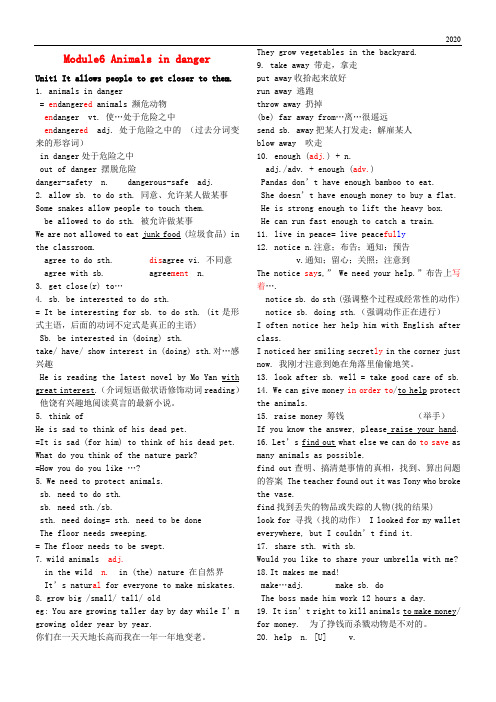
2020Module6 Animals in dangerUnit1 It allows people to get closer to them.1. animals in danger= en danger ed animals 濒危动物en danger vt. 使…处于危险之中en danger ed adj. 处于危险之中的(过去分词变来的形容词)in danger处于危险之中out of danger 摆脱危险danger-safety n. dangerous-safe adj.2. allow sb. to do sth. 同意、允许某人做某事Some snakes allow people to touch them.be allowed to do sth. 被允许做某事We are not allowed to eat junk food (垃圾食品) in the classroom.agree to do sth. dis agree vi. 不同意agree with sb. agree ment n.3. get close(r) to…4. sb. be interested to do sth.= It be interesting for sb. to do sth. (it是形式主语,后面的动词不定式是真正的主语)Sb. be interested in (doing) sth.take/ have/ show interest in (doing) sth.对…感兴趣He is reading the latest novel by Mo Yan with great interest.(介词短语做状语修饰动词reading)他饶有兴趣地阅读莫言的最新小说。
5. think ofHe is sad to think of his dead pet.=It is sad (for him) to think of his dead pet. What do you think of the nature park?=How you do you like …?5.We need to protect animals. sb. need to do sth.sb. need sth./sb.sth. need doing= sth. need to be doneThe floor needs sweeping.= The floor needs to be swept.7.wild animals adj.in the wild n. in (the) nature 在自然界It’s natur al for everyone to make miskates.8.grow big /small/ tall/ oldeg: You are growing taller day by day while I’m growing older year by year.你们在一天天地长高而我在一年一年地变老。
2019年外研版八年级上册英语教案:Module6Animalsindanger
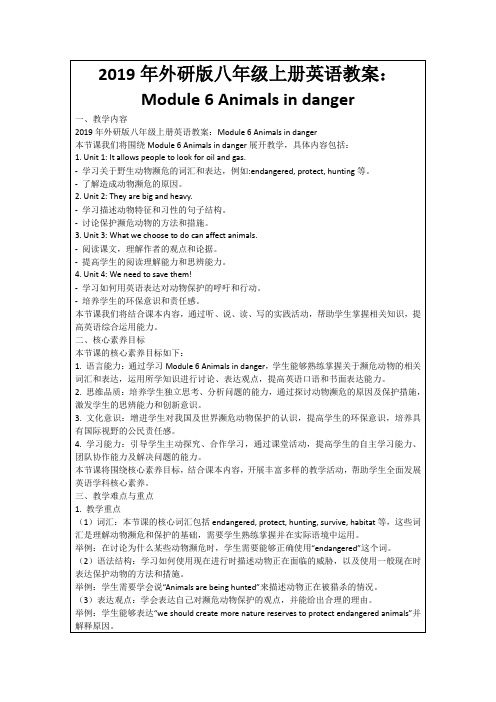
一、教学内容
2019年外研版八年级上册英语教案:Module 6 Animals in danger
本节课我们将围绕Module 6 Animals in danger展开教学,具体内容包括:
1. Unit 1: It allows people to look for oil and gas.
2.教学难点
(1)词汇的准确运用:学生可能难以准确区分和使用同义词或近义词,如“endangered”和“threatened”,以及“protect”和“preserve”。
举例:教师需要通过例句和语境练习帮助学生区分这些词汇的用法。
(2)语法结构的复杂性:在句子构建时,学生可能会混淆现在进行时和一般现在时的使用,特别是在复合句中。
2.实验操作:为了加深理解,我们将进行一个模拟保护计划的简短演示,展示如何制定和实施有效的保护措施。
3.成果展示:每个小组将向全班展示他们的讨论成果和模拟保护计划。
(四)学生小组讨论(用时10分钟)
1.讨论主题:学生将围绕“如何在日常生活中保护濒危动物”这一主题展开讨论。他们将被鼓励提出自己的观点和想法,并与其他小组成员进行交流。
(2)语法结构:学习如何使用现在进行时描述动物正在面临的威胁,以及使用一般现在时表达保护动物的方法和措施。
举例:学生需要学会说“Animals are being hunted”来描述动物正在被猎杀的情况。
(3)表达观点:学会表达自己对濒危动物保护的观点,并能给出合理的理由。
举例:学生能够表达“we should create more nature reserves to protect endangered animals”并解释原因。
外研版英语八年级上册Module 6《Animals in danger》(Unit 2)教学设计
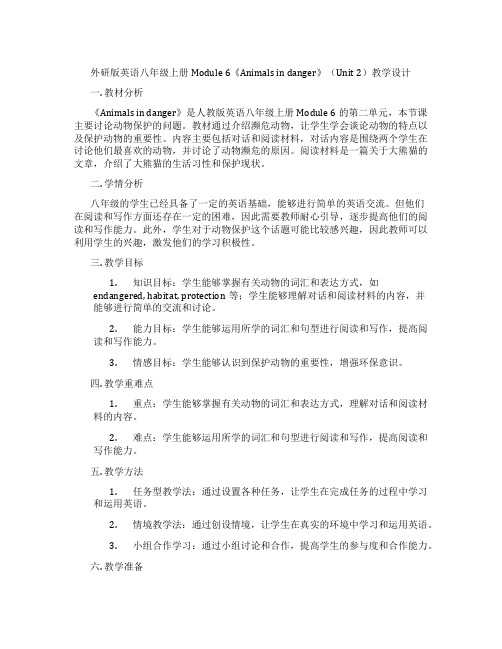
外研版英语八年级上册Module 6《Animals in danger》(Unit 2)教学设计一. 教材分析《Animals in danger》是人教版英语八年级上册Module 6的第二单元,本节课主要讨论动物保护的问题。
教材通过介绍濒危动物,让学生学会谈论动物的特点以及保护动物的重要性。
内容主要包括对话和阅读材料,对话内容是围绕两个学生在讨论他们最喜欢的动物,并讨论了动物濒危的原因。
阅读材料是一篇关于大熊猫的文章,介绍了大熊猫的生活习性和保护现状。
二. 学情分析八年级的学生已经具备了一定的英语基础,能够进行简单的英语交流。
但他们在阅读和写作方面还存在一定的困难,因此需要教师耐心引导,逐步提高他们的阅读和写作能力。
此外,学生对于动物保护这个话题可能比较感兴趣,因此教师可以利用学生的兴趣,激发他们的学习积极性。
三. 教学目标1.知识目标:学生能够掌握有关动物的词汇和表达方式,如endangered, habitat, protection等;学生能够理解对话和阅读材料的内容,并能够进行简单的交流和讨论。
2.能力目标:学生能够运用所学的词汇和句型进行阅读和写作,提高阅读和写作能力。
3.情感目标:学生能够认识到保护动物的重要性,增强环保意识。
四. 教学重难点1.重点:学生能够掌握有关动物的词汇和表达方式,理解对话和阅读材料的内容。
2.难点:学生能够运用所学的词汇和句型进行阅读和写作,提高阅读和写作能力。
五. 教学方法1.任务型教学法:通过设置各种任务,让学生在完成任务的过程中学习和运用英语。
2.情境教学法:通过创设情境,让学生在真实的环境中学习和运用英语。
3.小组合作学习:通过小组讨论和合作,提高学生的参与度和合作能力。
六. 教学准备1.教师准备教材、教案、课件等教学材料。
2.学生准备课本、笔记本等学习用品。
七. 教学过程1.导入(5分钟)教师通过向学生展示一些濒危动物的图片,引导学生谈论动物保护的话题。
外研版英语八年级上册Module 6《Animals in danger》(Unit 1)教学设计
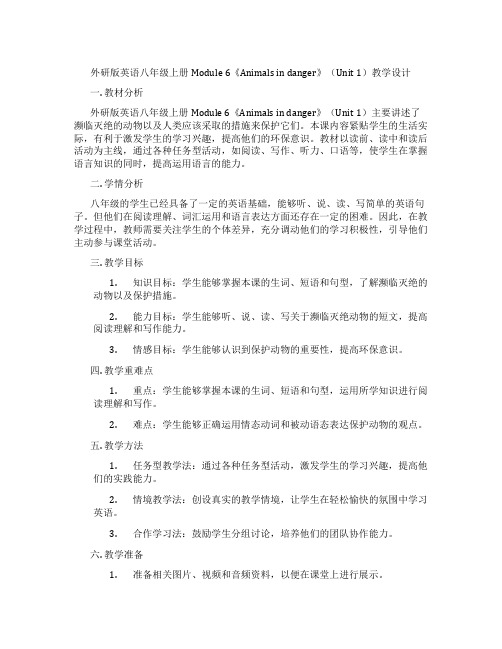
外研版英语八年级上册Module 6《Animals in danger》(Unit 1)教学设计一. 教材分析外研版英语八年级上册Module 6《Animals in danger》(Unit 1)主要讲述了濒临灭绝的动物以及人类应该采取的措施来保护它们。
本课内容紧贴学生的生活实际,有利于激发学生的学习兴趣,提高他们的环保意识。
教材以读前、读中和读后活动为主线,通过各种任务型活动,如阅读、写作、听力、口语等,使学生在掌握语言知识的同时,提高运用语言的能力。
二. 学情分析八年级的学生已经具备了一定的英语基础,能够听、说、读、写简单的英语句子。
但他们在阅读理解、词汇运用和语言表达方面还存在一定的困难。
因此,在教学过程中,教师需要关注学生的个体差异,充分调动他们的学习积极性,引导他们主动参与课堂活动。
三. 教学目标1.知识目标:学生能够掌握本课的生词、短语和句型,了解濒临灭绝的动物以及保护措施。
2.能力目标:学生能够听、说、读、写关于濒临灭绝动物的短文,提高阅读理解和写作能力。
3.情感目标:学生能够认识到保护动物的重要性,提高环保意识。
四. 教学重难点1.重点:学生能够掌握本课的生词、短语和句型,运用所学知识进行阅读理解和写作。
2.难点:学生能够正确运用情态动词和被动语态表达保护动物的观点。
五. 教学方法1.任务型教学法:通过各种任务型活动,激发学生的学习兴趣,提高他们的实践能力。
2.情境教学法:创设真实的教学情境,让学生在轻松愉快的氛围中学习英语。
3.合作学习法:鼓励学生分组讨论,培养他们的团队协作能力。
六. 教学准备1.准备相关图片、视频和音频资料,以便在课堂上进行展示。
2.设计好各个教学环节的任务和活动。
3.准备黑板、粉笔等教学工具。
七. 教学过程1.导入(5分钟)教师通过展示濒临灭绝的动物图片,引导学生谈论动物保护的话题,激发学生的学习兴趣。
2.呈现(10分钟)教师通过PPT或视频呈现濒临灭绝的动物以及保护措施,让学生了解相关背景知识。
外研版八年级英语上册Module 6 Animals in danger濒危动物

濒危动物是指所有由于物种自身的原因或受到人类活动或的影响,而有危险的野生动物物种。
从广义上讲,濒危动物泛指珍贵、濒危或稀有的。
从野生动物管理学角度讲,濒危动物是指《》附录所列动物,以及国家和地方重点保护的野生动物。
濒危动物具有绝对性和相对性。
绝对性是指濒危动物在相当长的一个时期内野生种群数量较少,存在灭绝的危险。
相对性是指某些濒危动物野生种群的绝对数量并不太少,但相对于同一类别的其他动物物种来说却很少;或者某些濒危动物虽然在局部地区的野生种群数量很多,但在整个分布区内的野生种群数量却很少。
一些国家或地区视为的野生动物,在另外一些国家或地区可能并不视为濒危动物。
一些种类的濒危动物在得到了有效保护、其野生种群数量明显上升、不再有灭绝危险时,也可以退出濒危动物的行列。
濒危动物等级的划分,有两种方法:1.两级法这是我国国家重点保护动物划分的标准,它是根据物种的科学价值、经济价值、资源数量、濒危程度以及是否为中国所特有等多项因素综合评价、论证而制定的。
I级:指我国特产稀有或濒于绝灭的野生动物。
II级:指数量稀少,分布地区狭窄,有绝灭危险的野生动物。
2.六级法这是()在其著名的《红皮书》中对受危胁物种的分级方法,近年来我国出版的部分《》中也开始用此法。
绝灭(Ex):指野生状态下已经绝迹,但人工饲养或放养的尚有残存,如。
国内绝迹(Ex):指国内野生状态的已经绝迹,国外尚有野生的,如高鼻羚羊。
濒危(E):野生种群数量已降低到濒临灭绝或绝迹的临界程度,且致危因素仍在继续,如、。
易危(V):野生种群数量明显下降,如不采取有效保护措施,势必沦为""者,或因接近某"濒危"级别,而必须予以保护以确保"濒危"种的生存,如金猫、。
稀有(R):从分类订名以来,总共只有为数有限的发现纪录者,如。
不足(I):情况不甚明显,但有迹象表明可能属于或疑为濒危或趋危者,如、假吸血蝠。
初中英语外研版八年级上册《Module 6 Animals in danger. Unit3 L
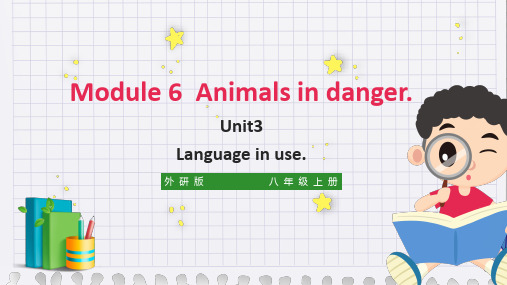
It is very important for us________English well.
(四川宜宾)
A. learn
B. learning
C. to learn
D. learned
考核句型It+is+important+for sb.+to do sth.“做某事对某人重要”,不定式作真正的主语, 故选C。
c) …plant more bamboo.
4 Help us…
d) …live in the nature park.
5 They came here…
e) … to be safe.
let sb do sth
They let the elephants live in the nature park.
Module 6 Animals in danger.
Unit3
Language in use.
外研版
八年级上册
1
Words revision. rpe答r情保soed应形护aurceh iinna夺d为tpael走an了asgcter 科足c野rr学a够e生ias家的的ete sdyme喂开政vbeo养办府lol p
Some snakes allow people to touch them.
I am the tiger’s cousin.
The lion needs to eat enough meat to keep strong.
I live in China. I like eaing bamboo.
Guessing game&Revision
I am tall and I have a long neck.
外研版英语八年级上册Module 6《Animals in danger》(Unit 3)教学设计
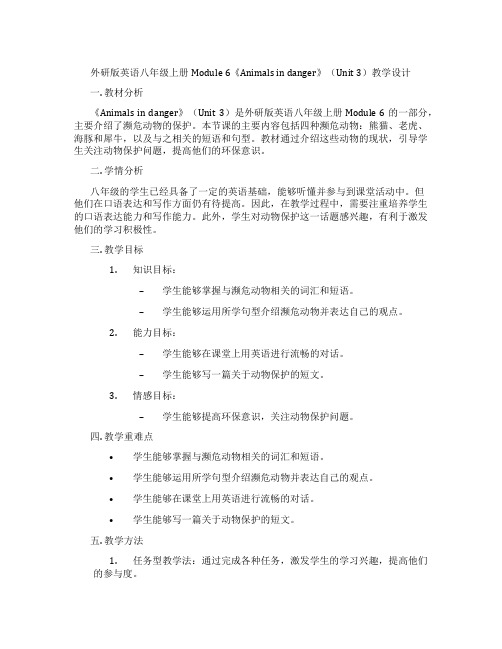
外研版英语八年级上册Module 6《Animals in danger》(Unit 3)教学设计一. 教材分析《Animals in danger》(Unit 3)是外研版英语八年级上册Module 6的一部分,主要介绍了濒危动物的保护。
本节课的主要内容包括四种濒危动物:熊猫、老虎、海豚和犀牛,以及与之相关的短语和句型。
教材通过介绍这些动物的现状,引导学生关注动物保护问题,提高他们的环保意识。
二. 学情分析八年级的学生已经具备了一定的英语基础,能够听懂并参与到课堂活动中。
但他们在口语表达和写作方面仍有待提高。
因此,在教学过程中,需要注重培养学生的口语表达能力和写作能力。
此外,学生对动物保护这一话题感兴趣,有利于激发他们的学习积极性。
三. 教学目标1.知识目标:–学生能够掌握与濒危动物相关的词汇和短语。
–学生能够运用所学句型介绍濒危动物并表达自己的观点。
2.能力目标:–学生能够在课堂上用英语进行流畅的对话。
–学生能够写一篇关于动物保护的短文。
3.情感目标:–学生能够提高环保意识,关注动物保护问题。
四. 教学重难点•学生能够掌握与濒危动物相关的词汇和短语。
•学生能够运用所学句型介绍濒危动物并表达自己的观点。
•学生能够在课堂上用英语进行流畅的对话。
•学生能够写一篇关于动物保护的短文。
五. 教学方法1.任务型教学法:通过完成各种任务,激发学生的学习兴趣,提高他们的参与度。
2.情境教学法:创设真实的情境,让学生在实际语境中学习英语。
3.合作学习法:鼓励学生分组合作,培养他们的团队精神。
六. 教学准备1.教师准备:–制作课件和教学素材。
–准备相关的视频和图片。
2.学生准备:–预习教材,了解本节课的主要内容。
–准备相关的词汇和短语。
七. 教学过程1.导入(5分钟)–教师通过展示濒危动物的图片,引导学生关注动物保护问题。
–学生分享他们对濒危动物的了解和观点。
2.呈现(10分钟)–教师通过课件呈现本节课的主要内容,包括词汇、短语和句型。
- 1、下载文档前请自行甄别文档内容的完整性,平台不提供额外的编辑、内容补充、找答案等附加服务。
- 2、"仅部分预览"的文档,不可在线预览部分如存在完整性等问题,可反馈申请退款(可完整预览的文档不适用该条件!)。
- 3、如文档侵犯您的权益,请联系客服反馈,我们会尽快为您处理(人工客服工作时间:9:00-18:30)。
Module 6 检测卷一、听力(听力)(共20小题;共20分)一、听力理解(本大题共20小题,每小题1分,共20分)A)在下列每小题内,你将听到一个句子并看到供选择的A、B、C三幅图画。
找出与你所听到的句子内容相匹配的图画。
1. A. B. C.2. A. B. C.3. A. B. C.4. A. B. C.B)下面你将听到十组对话,每组对话都有一个问题。
根据对话内容,从每组所给的A、B、C三个选项中,找出能回答所提问题的最佳选项。
5. What did Mike do on Thursday afternoon?A. He played rugby.B. He did weight training.C. He did some running.6. How does William's grandfather keep fit?A. By playing tennis.B. By running.C. By playing Taijiquan.7. What did the boy have for breakfast?A. Some milk and a hamburger.B. An egg and a hamburger.C. Some bread and an egg.8. What did Miss Brown talk about during the lesson?A. Healthy food.B. School dinner.C. A TV programme.9. What did the girl do?A. She did weight training for two hours.B. She ran for two miles.C. She played Taijiquan for two hours.10. What can we learn about the trip?A. It was an exciting trip.B. It was a short trip.C. It was a boring trip.11. How will they get home probably?A. On foot.B. By subway.C. By taxi.12. What will the man do?A. Write to her aunt.B. Call her aunt.C. E-mail her aunt.13. What sign did the man see?A. Be quiet.B. No smoking.C. No littering.14. What does the man mean?A. Mark should go on with the game.B. Mark should play outside.C. Mark should review his lessons.C)听下面长对话或独白。
每段长对话或独白后都有三个问题,从题中所给的A、B、C三个选项中选出最佳选项。
听下面一段材料,回答第15至第17小题。
15. Where are the two speakers talking?A. In the supermarket.B. In the library.C. In the post office.16. What is the boy looking for?A. A story book.B. A picture book.C. A book on animals.17. Why does the boy need it right now?A. Because he likes it very much.B. Because he has to write a report.C. Because he wants to lend it to someone.听下面一段材料,回答第18至第20小题。
18. Why did John's mother allow him to eat chocolates that Grandpa bought?A. Because they didn't cost her any money.B. Because she wanted to make Grandpa happy.C. Because she wanted to make John happy.19. When would John's birthday be?A. On Wednesday.B. On Saturday.C. On Sunday.20. Why did John shout in his bedroom?A. To make God know his wish.B. To make his mother know his wish.C. To make Grandpa know his wish.二、单词拼写(单句首字母填空)(共10小题;共10分)21. Are you i in this movie?22. We must give up using plastic bags in order to p our earth.23. Every spring my mother likes to g flowers and trees.24. They did some r on traffic accidents yesterday.25. He was in a very dangerous s because there were many wild animals around him.26. His favorite subject at school is science and he wants to be a s .27. ---What's the most important morning news on CCTV today?---The Chinese g warned Japan not to hurt the feelings of the Chinese people.28. The Great wall is a s of the Chinese nation.29. Every day, I have to f (喂养) the three dogs. I really hate doing that.30. There are many w animals in the forest.三、单词拼写(根据中文提示拼写单词)(共10小题;共10分)31. We can (筹集) money for the spring field trip by ourselves.32. The zoo keeper had to do a lot of (研究) on how to look after giant pandas.33. I am sure that we can (生产) this kind of engine.34. What do you think of (情景) comedy?35. Wheat (生长) in the north of China.36. I want to be a (科学家) when I grow up.37. We should (保护) the environment.38. Jim says he is very (感兴趣) in Chinese, for he thinks Chinese is very useful.39. My parents don't (允许) me to play computer games.40. Is the river deep (足够) to swim in it?四、翻译(根据中文提示完成句子)(共5小题;共10分)41. 我们应该尽力去帮助濒危动物。
We should try to help animals .42. 妈妈拿走了小Tommy的玩具,于是他哭了起来。
Mum little Tommy's toys and he cried.43. 我们很早便出发,为了避免塞车。
We left early avoid the traffic.44. 一些大学生毕业后选择自己创办公司。
Some college students choose to companies of their own after graduation.45. 我女儿想出一个学习英语的新方法。
My daughter a new way to learn English. 五、完形填空(共10小题;共15分)Do you like dolphins(海豚)? Dolphins live 46 water, but they are not fish. They are mammals(哺乳动物) that live in water. It has to (不得不) breathe(呼吸) air to the top of the water very often. A dolphin's nose isn't 47 to see. It's just a very small hole 48 top of the dolphin's head. This hole is called a blowhole. A dolphin 49 up every minute to breathe. It opens blowhole and takes air in, and then goes back into the water again. It can stay50 the water for six or seven minutes if it has to. A dolphin's ears are very small,51 its mouth is very 52 . It has almost one hundred teeth. A dolphin 53 very fast. Scientists are studying ways to 54 boat go faster through the 55 .46. A. in B. on C. above D. under47. A. easy B. difficult C. good D. fast48. A. on B. on the C. at D. above49. A. flies B. comes C. walks D. runs50. A. at B. up C. on D. under51. A. if B. or C. but D. so52. A. small B. big C. good D. nice53. A. goes B. swims C. runs D. walks54. A. make B. ask C. tell D. talk to55. A. air B. room C. land D. water六、阅读理解(共19小题;共38分)ADenzil wasn't a very clever donkey. He always did some silly things because he didn't think. "Look out," the other donkeys said. "Here comes Denzil—everybody runs away!"One day, Denzil carried two heavy bags of salt, one on each side of his back. When he was crossing a big river, he fell into the water. The salt began to melt. When he tried his best to stand up, all the salt was gone. "Hey, that's really great," thought Denzil. "I must remember that. Next time I can do it again when I'm crossing a river."The next time he carried two bags of cotton(棉花). "Watch this, everybody," said Denzil when he and his friends got to the middle of the river. He went into the water and was gone! Nobody told him that cotton could get heavier in water. The other donkeys pulled him out at once and luckily he was still alive.56. Denzil often caused trouble because .A. he was naughtyB. he didn't thinkC. he was carelessD. he was proud57. For the first time, Denzil crossed the river with .A. saltB. cottonC. woodD. nothing58. The underlined word "melt" means " " in Chinese.A. 凝结B. 蒸发C. 结冰D. 融化59. Denzil in the end.A. lost his life in waterB. went out of the water by himselfC. swam to the other side of the riverD. was saved by the other donkeys60. The best title of the passage is .A. A Donkey Crossing the RiverB. How to Cross the RiverC. How to Carry CottonD. A Donkey Saved OthersBThere are more and more people but fewer and fewer animals in our world now. We can seldom see birds and listen to their singing. Many animals can only be seen in the zoo or on books.As we all know, a lot of wild animals, such as pandas and tigers are in great danger. Recently, scientists found that the bees, which could still be seen everywhere now, were dying out, too. Can you imagine a world without bees? We would have no food if there were no bees working on the flowers.There are many laws to protect wild animals recently, but it is more important for us to do something for wild animals in our daily life. We can help make the world better by saving water, planting more trees and flowers and using less paper. Let's take animals as members of the world, but not just our food or pets. Let's share this beautiful world with them.61. We can seldom hear now.A. bird's singingB. children's singingC. music on TVD. noise in cities62. Which animal is NOT mentioned in the passage?A. Panda.B. Tiger.C. Bee.D. Dog.63. What would happen if there were no bees?A. We wouldn't get hurt.B. We would have no food.C. There would be more birds.D. Plants would grow better.64. We should take animals as .A. food and petsB. pets and friendsC. members of the worldD. members of the family65. What's the best title for the passage?A. Terrible World.B. Save the Bees.C. Plant More Trees.D. Save Wild Animals.CIn most parts of the world, many students help their schools make less pollution. They join Environment Clubs. In an environment club, people work together to make our environment clean. Here are some things students often do.● No-garbage lunches. How much do you throw away after lunch? Environment clubs ask students to bring their lunches in bags that can be used again. Every week they will choose the classes that make the least garbage and report them to the whole school!● No-car day. On a no-car day, nobody comes to school in a car---not the students and not the teachers! Cars give pollution to our air, so remember: walk, jump, bike or run.Use your legs! It's lots of fun!● Turn off the water! Do you know that some toilets an waste twenty to forty m3 of water an hour? In a year, that would fill a small river! In environment clubs, students mend those broken toilets.We love our environment. Let's work together to make it clean.66. Environment clubs ask students .A. to run to school every dayB. to take exercise every dayC. not to forget to take carsD. not to throwaway lunch bags67. On a no-car day, will take a car to school.A. both students and teachersB. only studentsC. neither students nor teachersD. only teachers68. After students mend toilets, they save .A. a small riverB. a clubC. a lot of waterD. a toilet69. The writer wrote the passage to ask students to .A. clean schoolsB. make less pollutionC. join clubsD. help teachersDPreparation is the key to successful travel. In order to have a pleasant trip, you must prepare well before you start off. The most important thing you should do is to pack(把东西装入) your bags with useful things.About all, ★. For example, if you travel to another country, you must remember to take your passport with you. You should also take clothes that are suitable for the climate, such as a sweater, a swimsuit, a raincoat and suitable shoes. One more thing, never forget to take some medicine with you in case (以防) you get sick.In addition to these things, you should remember to take a camera so that you can take pictures of the places you visit. To keep in touch with your family and friends, you should carry a cell phone, too. It would also be good to carry a directory with all your family's and friends' telephone numbers in it. That way, if something goes wrong with your cell phone, you can still get in touch with them by using a public telephone.70. Which of the following is the best to put in ★?A. find out as much information as you canB. you must choose the right place before you start offC. pack your bags with the necessary thingsD. there are some other things that you may want to take71. What does the underlined word “directory” mean in Chinese?A. 旅游手册B. 地图册C. 便签簿D. 电话簿72. This passage is most probably from a .A. storybookB. grammar bookC. dictionaryD. travel magazine73. From the passage, we can know that .A. We need a good plan and preparation before travellingB. The most important thing is to take a camera with usC. We don't have to take any medicine with us if we are healthyD. We can pack our bags with as many things as we like74. What's the best title of the passage?A. Why to travelB. Where to travelC. Things to take when travellingD. Be careful when travelling abroad七、短文7选5(5选5等)(共4小题;共8分)One day, while I was walking along the street, I noticed a piece of wood.75. I picked him up and found he was badly hurt. I took it home as quickly as possible.After several days, the cat got well. The cat was very small.76. So I called it Little Bit. At that time, I loved Little Bit very much. Wherever I went, I always took him. Any time I was home, he never left my side.77. I spent most of my time with my friends. I would come in the house on my phone and not make time for Little Bit at all.Until one day, I found something was wrong with him and I took him to the pet hospital, but they could do nothing. 78.Little Bit's death made me realize how much he meant to me. I feel sorry for not always being there for him. I will always remember the special memories we made.A. However, I grew up.B. I could even put him into my pocket.C. Under the wood was a small black cat.D. My parents loved him very much.E. The poor cat filled my arms and died.八、阅读与表达(问答式)(共5小题;共10分)Dear Sandy,I got to Beijing two months ago. My parents and I live in a flat in Beijing. I make a few friends here. Mike is an American. He is good at making things. Last week he made me a pumpkin lantern(灯笼). Zhu Gang is a Chinese. He lives near my home. We often go to school together. He rides the bike well. Sometimes I sit on his bike. Annie is an Australian girl. She has long hair. She is slim, and she always wears fashion clothes. Yesterday she wore a black skirt, long brown boots and a yellow blouse. Daniel likes eating snacks very much, though he is a boy. Sometimes Annie and I ask him for snacks. You know we girls always like snacks. But he is very funny. He always tells me some interesting stories. Well, I don't think you can recognize(认出) me now because I cut my hair short last Sunday. And I get thinner than before.Now it's very cold in Beijing. How is the weather in New York? Please e-mail me and tell me something about you.Yours,Kate 根据短文内容,完成下列小题。
